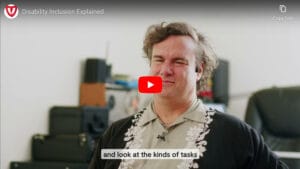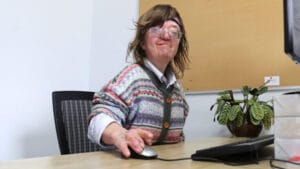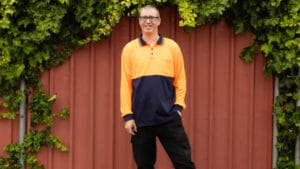
Listen to Caroline’s story here.
Caroline’s journey exemplifies the profound impact of volunteering, both on oneself and the community. Despite living with a disability, her focus remains on aiding others, and for her, volunteering is a means to “contribute to the community, develop new skills and knowledge, and make friends.”
With rich experiences spanning over 25 years, Caroline’s volunteer roles have been as diverse as her skills. She has volunteered in retail, administration, research, fundraising, events, and on boards. She has provided advice to organisations and contributed to submissions on disability and a paper on inclusion.
Her passion for making a difference led her to pursue a Certificate IV in Community Service Work, specialising in disability. Caroline credits this certification with enhancing her skills and confidence, enabling her to share her experiences and advocate for others with disabilities.
In 2012, she dedicated her time to 26Ten, an organisation affiliated with Libraries Tasmania, where she assisted a person with disability in learning to write. In 2017, Caroline published ‘A Changed and Uplifted Life,’ a book chronicling her volunteer journey with the Choir of High Hopes Hobart and other organisations. Reflecting on this endeavour, she notes, “I wanted to raise the choir’s profile in the community. The Story Island Project assisted me in writing my book, and they got me to undertake a workshop with some of my friends from the choir to get their assistance as well.”
Caroline is a vocal advocate for improving the volunteer experience for people with disabilities. She emphasises the importance of open communication between organisations and volunteers with disabilities, suggesting that a personalised approach is key. “Try to get to know them. Ask the person what they would like to do for the organisation. Ask them how the organisation can help them. The idea that one job fits everybody just doesn’t work.”
She underscores the need for flexibility, encouraging organisations to consider remote volunteering options and tailor roles to individuals’ abilities. Sharing her own experience, Caroline advises, “If there’s a job that the person can’t do, leave that. Don’t give them jobs without knowing what they can do and what they can’t.”
In Caroline’s view, the benefits of including people with disabilities in volunteer programs are manifold. She states, “People with disabilities are available, have skills, and want to work. The organisation might learn from the person what their disability is like, what the person has to go through.”
Caroline advocates for organisations to undergo disability awareness training and suggests asking prospective volunteers with disabilities, “What support, if any, do you need to volunteer with us?”
Expressing her deep love for volunteering, Caroline shares, “I love to share my experiences and ideas and to develop new skills. Volunteering has always been and will always be an important part of my life. I love it, I help people and, in turn, they help me.”
Caroline’s story serves as an inspiring testament to the transformative power of volunteering for individuals and communities alike.






